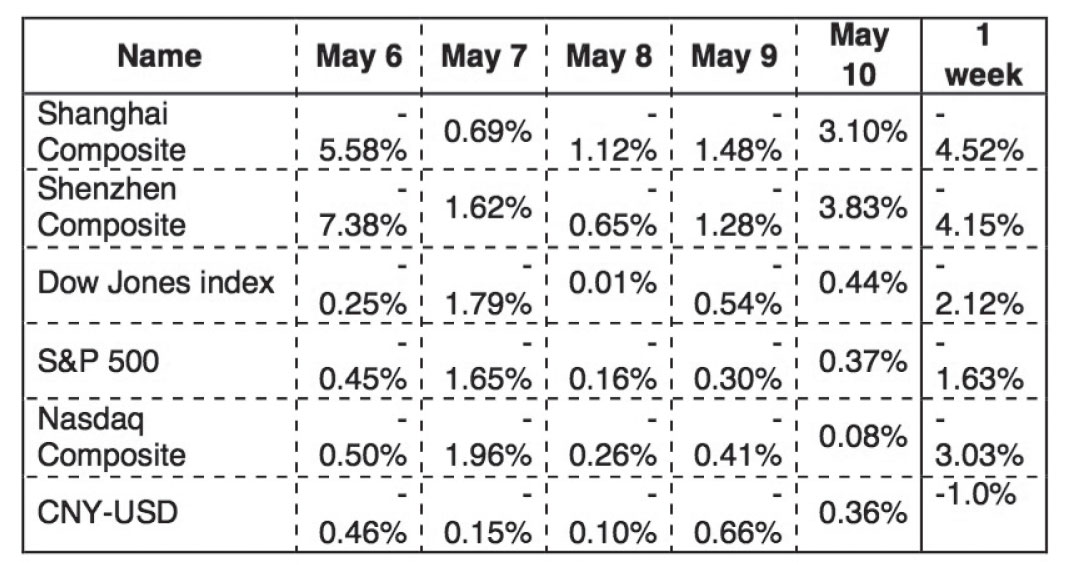Deal or no deal?

After touting “constructive” talks and “narrowing of differences” between the US and China regarding trade, Trump threw a curveball with his Sunday night tweets. From having an optimistic view on the trade deal, Trump showed his displeasure and decided to escalate trade tensions by raising tariffs. Instead of a trade deal, what we got were Trump’s tweets below:
“For 10 months, China has been paying tariffs to the USA of 25 percent on $50 billion of high tech, and 10 percent on $200 billion of other goods. These payments are partially responsible for our great economic results. The 10 percent will go up to 25 percent on Friday. $325 billion of additional goods sent to us by China remain untaxed, but will be shortly, at a rate of 25 percent. The tariffs paid to the USA have had little impact on product cost, mostly borne by China. The trade deal with China continues, but too slowly, as they attempt to renegotiate. No!”
Global stocks lost $13 billion per word
The out-of-the blue tweets caught markets by surprise as they were positioned for a trade resolution, not an escalation. As much as $1.4 trillion worth of global stock market value was wiped out ever since Trump made the tweet. Totaling 102 words, this means that $13 billion per word were lost from the market capitalization of the MSCI All Country World index.
Tale of the tape
With China being the victim of punitive tariffs from the US, it is no surprise that its stock market bore the brunt of the losses. As can be seen in the table below, China’s stock market losses on the first day after Trump’s tweet exceeded five percent. In contrast, the US barely fell on the first day. However, as it became clearer that Trump was not bluffing, US equity indices started to slide as well. As for the Chinese yuan, it was down one percent against the US dollar last week.

Source: Wealth Securities research
Temper tantrum or pressure tactic?
At the start of the previous week, it was not yet clear whether Trump’s tweet was a temper tantrum or pressure tactic. For example, when North Korea did not accede to some of the US’ requests regarding denuclearization, Trump simply walked out of the summit. This could also be part of Trump’s “Art of the Deal” playbook, where he makes drastic demands at the last minute. Given his real estate background, it is worth nothing that last minute threats are well within the pattern of standard negotiations as one side tries to secure more leverage going into the final round.
‘China broke the deal’
As the days went by, it became clear that there was indeed a breakdown in negotiations. As Trump said during a rally, “China broke the deal”. Sources close to the White House said that a draft trade agreement sent by China on May 3 had numerous changes that practically reversed Chinese commitments given to the US. In seven chapters of the draft, China deleted provisions regarding changing laws on intellectual property, forced technology transfers, and currency manipulation. Without the binding language, the US trade team felt that they had nothing to hold on to. The response of the US was summed up by Trump – “They can’t do that, so they’ll be paying.”
Phl a victim of collateral damage
With global markets plunging as Trump decided to raise China tariffs last week, Philippine stocks dropped as well. After touching the formidable 8000 resistance, the PSEi suffered from collateral damage, falling 2.9 percent for the week. The Philippine peso depreciated 0.7 percent.
Local developments overshadowed by Trump tweets
Recently, there were many significant developments for the country. S&P upgraded our country’s credit rating to BBB+, the highest ever. April inflation came in at three percent, a very good figure. 1Q19 GDP growth came in at 5.6 percent, below forecasts of six percent as the trade deficit widened and government spending slowed down. In response to slowing growth, the BSP decided to cut interest rates by 25 bps to 4.50 percent. While a rate cut is positive for growth and equities, this may have a negative impact on the peso. All these significant events were overshadowed by the breakdown in US-China trade talks.
Everyone gets hurt
Like an epic movie, the US-China trade war has gone through many twists and turns, for better or for worse. In a press conference Thursday afternoon, Trump said he got a beautiful letter from China President Xi Jinping and that they would have a phone call. Despite these, Trump still went ahead with raising tariffs last Friday, saying “there is absolutely no need to rush” a deal. On the other hand, US markets recovered as Trump tweeted that “the US and China have held candid and constructive conversations on the status of the trade relationship between both countries.” For its part, China has vowed to implement countermeasures. There are hopes that Vice Premier Liu may yet salvage a deal. While it is difficult to determine if there will be a deal or no deal, it is clear that escalation in the US-China trade war is not a zero-sum game. A trade war will hurt not just the two giants, but even innocent bystanders such as the Philippines.
* * *
Today, we are having Philippine midterm elections. We encourage everyone to exercise their right of suffrage. Go out and vote!
Philequity Management is the fund manager of the leading mutual funds in the Philippines. Visit www.philequity.net to learn more about Philequity’s managed funds or to view previous articles. For inquiries or to send feedback, please call (02) 689-8080 or email [email protected].
- Latest
- Trending

























